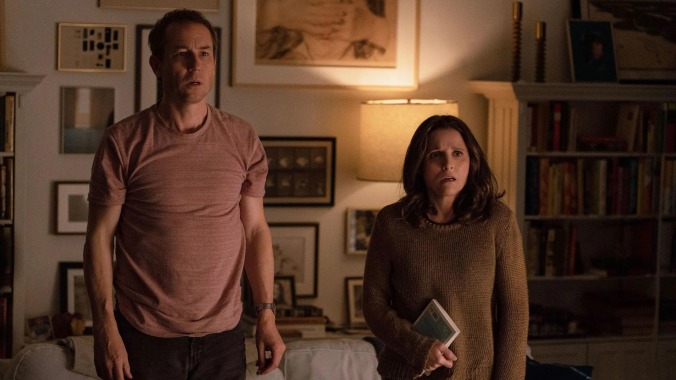You Hurt My Feelings review: Julia Louis-Dreyfus shines in this low-stakes jewel
The Seinfeld alum plays an author spiraling out of control in director Nicole Holofcener’s latest look at contemporary relationships

You Hurt My Feelings stars Julia Louis-Dreyfus as a writer named Beth sent into an existential tailspin over a negative response to her latest work. There is, however, a twist. The pan does not come from a stranger in an online pop culture journal, but, instead, from her husband. What’s worse—or, at least, what makes this an unusual situation—is that Beth’s husband Don (Tobias Menzies) is supportive and says “the right thing” to her face, but when he’s having what he thinks is a private conversation while shopping for socks, he tells his buddy (Arian Moayed) that he thinks Beth’s book stinks.
Let me say here and now that this movie is very good. It’s not likely to end up on my top 10 of the year, but maybe the top 25? And, in a way, that’s even more perfect. What Holofcener has created is the ne plus ultra of low stakes cinema. The lives of Beth and Don—a burned out therapist who has begun getting his patients’ problems mixed up—are in no peril. They are wealthy New Yorkers who live in a brownstone and get their bagels at Zabar’s. But you know very well that little things can eat away at your brain and cause just as much consternation as real problems. (And there’s no amount of telling yourself “this isn’t that big of a deal!” that will make it less of a big deal.) As such, a movie like You Hurt My Feelings is a work of art that is probably more reflective of our actual lives than 99 percent of what we watch. And thank God for that!
There’s a wonderful little moment in the middle of the film; Beth and her sister Sarah (Michaela Watkins) meet at their mother Georgia’s (Jeannie Berlin) apartment for lunch. The scene lays the groundwork for sitcom shenanigans, especially with the deadpan, slack-jawed Georgia swooping into the dining room. The trio chit-chat and Beth says she’d like to take some potato salad with her. Despite a surfeit of Tupperware-style products, Mom suggests she just plop some of the stuff directly into some aluminum foil and carry it home. Beth sighs, Sarah shrugs, and the topic eventually gets changed.
In real life, your mother telling you to bring home potato salad in aluminum foil is funny and the type of thing you’d grouse about to your friend. But what most screenwriting teachers would tell you that just because something is zany in life, it isn’t likely to come across as zany on screen. You need to raise the stakes. If this were an episode of Seinfeld, Jerry and Elaine would start shouting “the foil! She wanted it in the foil!” and turn it into a bit, which doesn’t work in a droll indie comedy. But this is why Holofcener is a genius. Her whole movie (and, really, her oeuvre going back to Walking And Talking in 1996) is potato salad in aluminum foil—little observations that aren’t overblown, just amusing and real. Examined bit by bit, it doesn’t seem like much, but the essence of that silvery wad of potato salad eventually transforms into something meaningful.





















![Rob Reiner's son booked for murder amid homicide investigation [Updated]](https://img.pastemagazine.com/wp-content/avuploads/2025/12/15131025/MixCollage-15-Dec-2025-01-10-PM-9121.jpg)


















